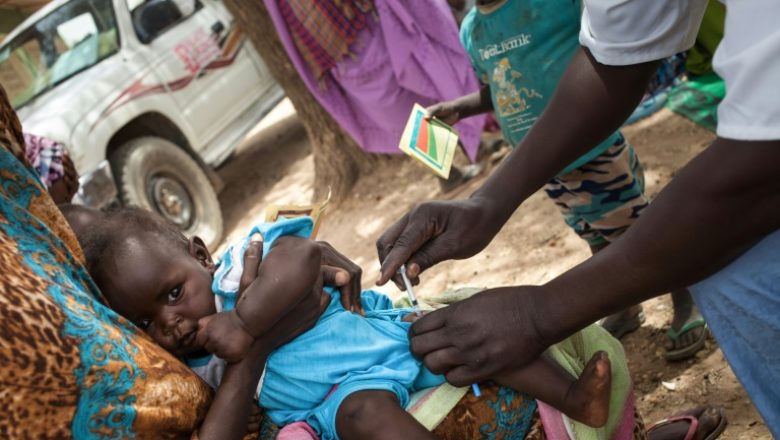AFP |
Dinar Tchere is fighting time and the sun, and he fears he may be losing. This morning, the health worker is expected in a remote village of eastern Chad, where he will administer the measles, mumps and rubella vaccine to poor children.
But he’s behind schedule — and there is limited time before his enemy, the blistering Sahelian heat, will destroy his precious drugs. Tchere takes his gear and the ice-packed cooler that shields the vaccines, puts them in an NGO pickup and heads out from his clinic in Hilouta, in Ouaddai province, on the dusty untarmacked road.
Measles is often dismissed by so-called anti-vaxxers who oppose immunisation as a disease of the past or non-threatening.
Twenty minutes later he is in Agang, a village of 400 people, and there, another private dread has turned to reality. No-one is there to be vaccinated. “It’s just what I feared — most of the mums have gone off to the market to do their shopping,” groans Tchere, a stocky, shaven-headed man in his fifties.
There is nothing to do but hope that the mothers and their children will return. He stretches out a mat on the soil, under a mango tree. His luck starts to turn. One by one, mothers with their children make their way to the spot, and soon there is no room on his mat for youngsters waiting for their jab.
Read more: Consequences of Undernutrition-Reduced Future Productivity of Children
Cold Chain
Always worried by the heat — the thermometer now reads 40 degrees Celsius (104 degrees Fahrenheit) — Tchere dips his finger into the cooler to check that the ice has not melted, and starts the vaccination. “Our biggest headache is ensuring that the vaccines are always kept cold,” says Tchere, who heads one of 21 health centres in the region.
“Since the troubles of 2007, we no longer have a solar panel or fridge.” The “troubles” refer to years-long violence by armed groups on the tense border between Sudan and Chad. Hilouta, which lies less than two kilometres (one mile) from the border, became a combat zone.
Twenty minutes later he is in Agang, a village of 400 people, and there, another private dread has turned to reality. No-one is there to be vaccinated.
With no power, how does Tchere keep his vaccines cool? “I stock them in Sudan, in a clinic on the other side of the border. They’ve got a fridge,” he explains. But there’s a problem: because of security concerns, Sudan refuses to let people cross the border by motorbike — Tchere’s only form of transport when he cannot use the pickup.
So on the eve of every immunisation session, Tchere walks into Sudan, carrying his cooler, fills it up with vaccines, and walks back into Chad. His clinic administers to about 60 villages. He says he does four vaccination sessions per month — two in the clinic, and two in the villages.
Read more: Thousands attend mass in Morocco with the Pope
Most often, he does the outside trips on his motorbike, always taking care never to take the same route back home, in order to avoid holdups. The state no longer pays the running costs of his health centre — a French NGO, Premiere Urgence Internationale (PUI), has stepped in, using financial help provided by the European Union.
In Arkoum, about 50 kilometres (30 miles) from Hilouta, Felix Djembonoudji, a nurse who runs the health centre, says that the stockpile of vaccines — held in the district’s main town of Adre, several hours away by road — has run out. “The people (in Adre) sometimes don’t receive any — we’ve been without MMR (vaccine) for five days,” he says.
Measles Threat
Measles is often dismissed by so-called anti-vaxxers who oppose immunisation as a disease of the past or non-threatening. Experts say that it is neither — measles is on the comeback trail. And out of every 20 children who catch measles, as many as one will suffer from pneumonia, according to the US Centers of Disease Control (CDC). Blindness, encephalitis and severe diarrhoea are also serious complications.
So on the eve of every immunisation session, Tchere walks into Sudan, carrying his cooler, fills it up with vaccines, and walks back into Chad.
Only one child in five in Chad is fully vaccinated against measles, according to a 2017 survey. “Measles can also cause malnutrition in non-vaccinated children, which in itself is a cause of premature death,” said PUI’s mission chief in Chad, Fabienne Mially. According to UN figures, more than one child in 10 in Chad will die before their fifth birthday.
Read more: Muslim Morocco counts small Christian community
In Agang, the measles vaccination session comes to an end, and Tchere is packing up his gear when a horse appears on the horizon, its hooves kicking up dust, bearing a man and his six-month-old baby. The infant needs his second MMR vaccine. “It’s important!” pleads the father. The child will get his jab.
Tchere returns to his clinic in Hilouta. There is no water or electricity. Two local people are awaiting him in the gloom, desperate for a medical consultation. “The working day is long,” he sighs, as he welcomes them in.
© Agence France-Presse














